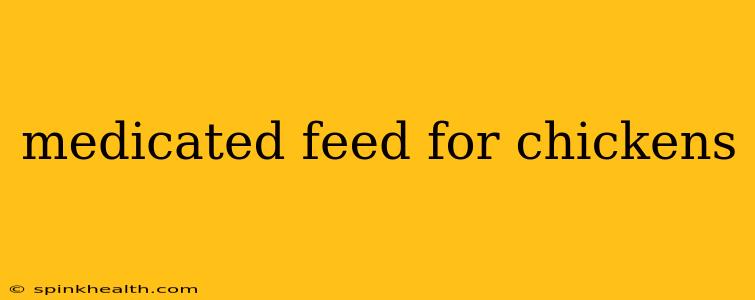Medicated Feed for Chickens: A Deep Dive into Responsible Use
The clucking chorus of your backyard chickens is music to your ears, but what happens when illness threatens your feathered friends? This is where medicated chicken feed enters the picture. While offering a convenient way to administer medication, it's crucial to understand its responsible use. This isn't just about keeping your birds healthy; it's about ensuring the safety of your family and the environment.
This article will explore medicated chicken feed, addressing common questions and concerns surrounding its application. We'll navigate the complexities of responsible use and dispel some common misconceptions. Let's delve into the world of keeping your flock healthy and thriving.
What is Medicated Chicken Feed?
Medicated chicken feed is a specialized type of feed containing antibiotics or other medications to prevent or treat specific diseases in poultry. Imagine it as a proactive or reactive healthcare strategy for your flock. These medications are carefully incorporated into the feed, ensuring each bird receives a consistent dosage with every meal. It's a far more efficient method than individually medicating each chicken, particularly for large flocks. However, this convenience comes with responsibilities that must be carefully considered.
What Diseases Does Medicated Feed Treat?
Medicated feed isn't a cure-all. It's targeted towards specific diseases common in poultry. These might include bacterial infections like E. coli, Salmonella, or Coccidiosis, which can severely impact flock health. The specific medication in the feed will depend on the disease being targeted. It's crucial to consult a veterinarian to determine the appropriate medication for your flock's needs. Self-medicating your chickens can be risky and may lead to ineffective treatment or the development of antibiotic resistance.
How Does Medicated Feed Work?
The medication is evenly distributed throughout the feed, ensuring that each bird receives a consistent dose with each meal. This makes it a far simpler method of treatment compared to administering medications individually. The bird ingests the medication with their regular feed, ensuring compliance. However, the effectiveness relies on proper feeding practices. Uneven feed distribution can lead to some birds receiving insufficient medication.
Is Medicated Feed Safe for Consumption?
This is a critical point. The use of medicated feed should always adhere to withdrawal periods. These periods are crucial to ensure that the medication has completely cleared the chicken's system before slaughter. Failure to observe these periods can lead to drug residues in the meat and eggs, potentially posing health risks to consumers. Always consult the feed label and follow the instructions meticulously.
What are the Withdrawal Times for Medicated Feeds?
Withdrawal times vary greatly depending on the specific medication used in the feed. These times are clearly indicated on the feed label. They represent the period between the last dose of medication and when the bird can be safely slaughtered for consumption. Disregarding withdrawal times can lead to contamination of the meat and eggs, potentially with serious consequences for human health.
Can I Make My Own Medicated Feed?
No, it's strongly advised against making your own medicated feed. Precise dosages are crucial for effectiveness and safety. Incorrectly mixing medications can lead to ineffective treatment or harmful consequences for your flock. Furthermore, it's important to ensure the medication is suitable for consumption by chickens, and there is always the risk of error during preparation. Leave medication to the experts.
Where Can I Buy Medicated Chicken Feed?
Medicated feed is typically available from agricultural supply stores, feed mills, and some veterinary clinics. When purchasing, ensure the product is appropriately labeled, specifying the active ingredients, dosages, and withdrawal times. You may need a prescription or veterinary consultation depending on the specific medication required. Always consult your veterinarian before using medicated feeds.
Are There Alternatives to Medicated Feed?
Yes, there are alternatives to medicated feed. Good biosecurity practices, including regular cleaning and disinfection of the coop, proper ventilation, and providing a balanced diet, are essential in preventing many diseases. Additionally, a strong immune system plays a crucial role. Supportive measures like probiotics or prebiotics might help strengthen the birds’ natural defenses.
Medicated feed can be a valuable tool in maintaining a healthy flock, but it's a tool to be used responsibly and with the guidance of a veterinarian. It is a critical part of responsible poultry husbandry, combining scientific knowledge with a deep respect for animal welfare and human health. Always prioritize preventative care, a balanced diet, and good biosecurity practices to reduce the need for medication in the first place.

